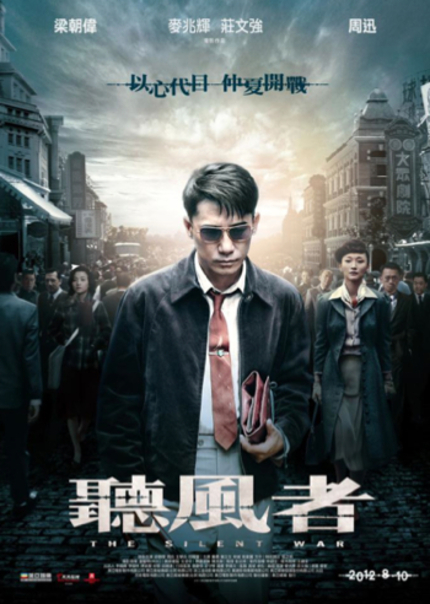Review: THE SILENT WAR is All Static, No Message

Writer-directors Alan Mak and Felix Chong have been enjoying a decent run of form, with Overheard, The Lost Bladesman and then Overheard 2 putting to rest initial doubts that the pair couldn't match the critical or commercial success of their Infernal Affairs trilogy. The Silent War marks their first foray into the enduringly popular sub-genre of the Mainland period political thriller, and reunites them with leading man Tony Leung. The film is adapted from the novel Plot Against by Chinese author Mai Xia, whose work also inspired Chen Kuo-Fu's 2009 film The Message, also starring Zhou Xun. However, while the Overheard films succeeded in turning surveillance into tense drama, and The Message made you care about characters who performed similar tasks for the CPC, The Silent War largely fails to recapture either of these essential elements.
It is easy to see why Tony Leung was attracted to the role of He Bing. Filmed during one of the many production breaks of Wong Kar Wai's still unfinished The Grandmasters, the role isn't at all physically demanding, and often demands little more of Leung than to sit at a desk twiddling radio knobs. His character never engages the enemy directly, nor does he have any dramatic scenes of emotional grandstanding. In truth, He Bing is not a particularly heroic or even likeable character. Raised in modest surroundings by his mother, he is plucked from obscurity to serve his country, which he does without too much persuasion. He has an odd sense of humour and a somewhat abrasive manner, which is often grating rather than charming, which appears to be the intended response. Performing for most of the film behind dark glasses or milky white contacts, Leung struggles to make Bing sympathetic, despite the actor's own inherently amiable personality.
As a result, the film's heroics fall to Zhou Xun, who acquits herself admirably in a sadly underwritten role. Xue Ning is above all else a Secret Service agent, proudly throwing herself in harm's way for love of her country, and on more than one occasion she must defend He Bing in hand-to-hand combat. Xue Ning must also work deep undercover when the mission demands, while juggling an are they/aren't they relationship with Intelligence director Guo aka "Devil" (Wang Xue Bing), and also her growing feelings for Bing. Zhou is easily the best thing in the film, and impresses in equal measure whether turning heads at a glamorous Shanghai function, or engaging in high-stakes mind games with the enemy round a mah jong table. It is a shame that the film isn't more focused on her exploits, by turn heroic and tragic, as Xue Ning makes a far more interesting subject than poor He Bing.
Mak and Chong clearly recognise that many of their film's most dramatic elements occur over the airwaves, with their hero sat on his own in a padded room, and ramp up the flashy editorial tics to give the audience some indication that exciting stuff is happening. They employ one particularly successful visual motif of flickering stenographers appearing and disappearing from the frame as Bing scours the airwaves for their transmission, but even when these devices work, there is no escaping the fact they are compensating for a lack of genuine onscreen tension. At the centre of The Silent War is a love quadrangle between Bing, Xue Ning, Director Guo and the unassuming Shen Jing (Mavis Fan), whose potentially fascinating backstory is quickly brushed aside and she is instead presented as a more down-to-earth love interest for Bing. Sadly, little drama is wrung from the romantic gridlock between these characters, as the film really seems committed to focussing on Bing's relationship with his radio.
The larger theme of the film is clearly that there is no greater love than for one's country, and the emotional yearnings and heartbreaks of the individual matter not at all when your homeland is on the brink of self-destruction. For much of The Silent War, I was thankful that the political ramifications of what was happening onscreen were largely left unspoken, in favour of telling (however poorly) a straightforward counter-espionage thriller, in which the heroes and villains could really have hailed from anywhere. That all goes out the window in the film's big finale, however, as the funeral of one of the film's major characters is intercut with an assassination attempt on the head of the PLA, during a speech of shameless rousing nationalism. As if they could hold it back no longer, the screen is suddenly awash with flags, starred uniforms and vast processions of precision grieving.
The Silent War must be considered a step back for Alan Mak and Felix Chong, regardless of how well it performs at the Mainland box office. Technically the film is a slick and accomplished, yet soulless, exercise that largely squanders its big name cast and potential for palm-sweating spy-based thrills in favour of good lighting and not much else. Hopefully this production was simply "one for them", after which Mak and Chong can return their focus to present day Hong Kong and continue making exciting dramas about our current socio-economic climate, or crime thrillers, or even tackle a comedy (as Chong proved capable of with Once A Gangster), because The Silent War is mostly just dead air - bland, uninspired and instantly forgettable.

Do you feel this content is inappropriate or infringes upon your rights? Click here to report it, or see our DMCA policy.





